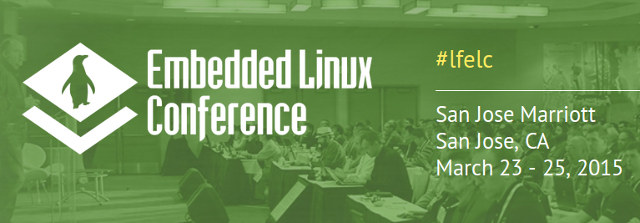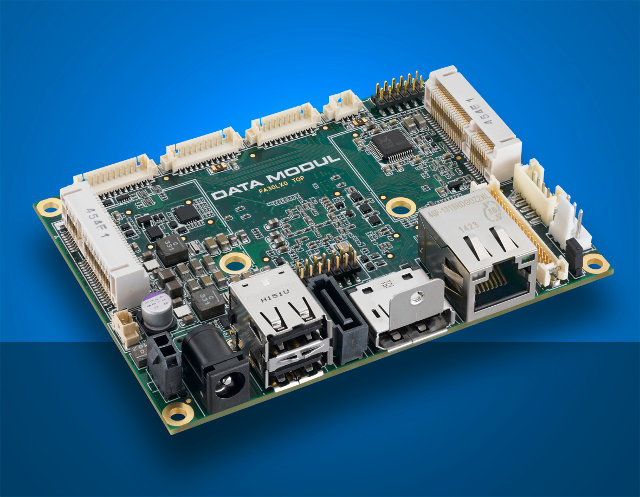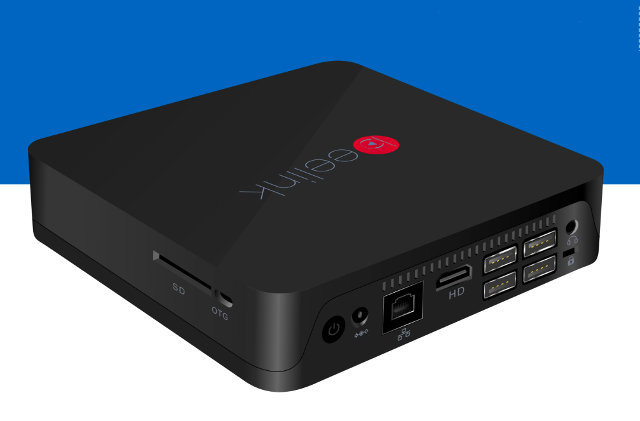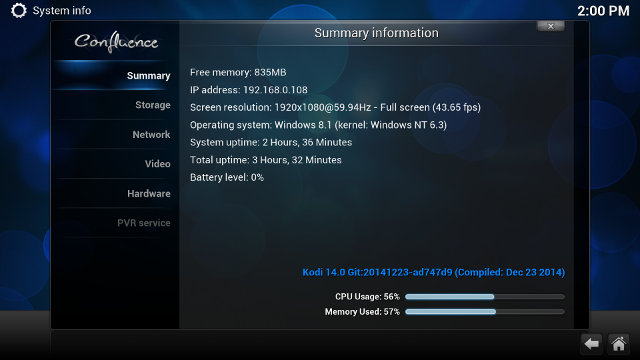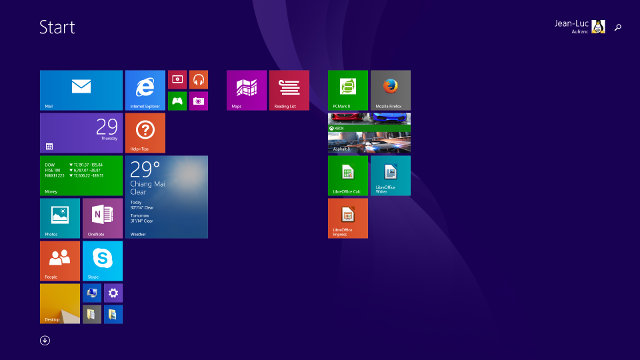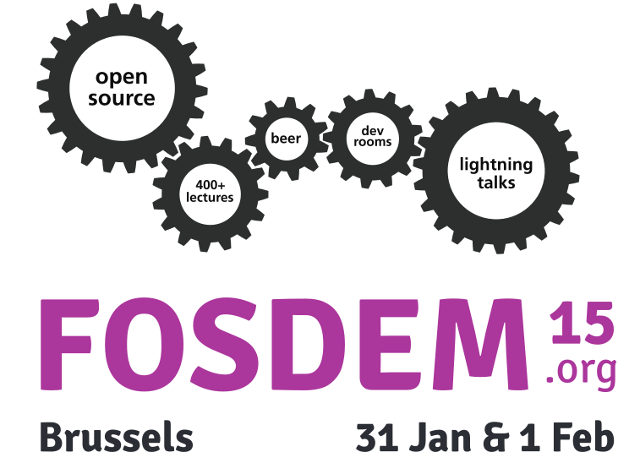Linus Torvalds released Linux Kernel 3.19 yesterday: So nothing all that exciting happened, and while I was tempted a couple of times to do an rc8, there really wasn’t any reason for it. Just as an example, Sasha Levin used KASan and found an interesting bug in paravirtualized spinlocks, but realistically it’s been around forever, and it’s not even clear that it can really ever trigger in practice. We’ll get it fixed, and mark it for stable, and tempting as it was, it wasn’t really a reason to delay 3.19. And the actual fixes that went in (see appended shortlog) were all fairly small, with the exception of some medium-sized infiniband changes that were all reverting code that just wasn’t ready. So it’s out there – go and get it. And as a result, the merge window for 3.20 is obviously also now open. Linus Linux 3.18 improved performance of […]
Embedded Linux Conference 2015 Schedule – IoT, Cars, and Drones
Embedded Linux Conference 2015 will take place in San Jose, California, on March 23 – 25, 2015, and will focus on Drones, Things and Automobiles. The schedule has been published, and whether you’ll attend or not, it’s always interested to have a look at what will be talked about to have a peak into the future of Embedded Linux, or simply keep abreast with the progress in the field. So as usual, I’ve gone through the schedule, and made my own virtual program with talks that I find interesting. Monday 23rd 9:00 – 9:30 – Driving standards and Open Source to Grow the Internet of Things by Mark Skarpness, Director of Systems Engineering at Intel Billions of devices are beginning to come online, and many of these devices, large and small, are running open source software. To fuel this innovation, it’s more important than ever for these devices to use […]
Data Modul eDM-pITX-BT pico-ITX Boards Powered by Intel Bay Trail Processors
Data Modul has introduced industrial pico-ITX boards based on low power Intel Atom or Celeron Bay Trail processors, that include a Gigabit Ethernet port, LVDS, HDMI or DisplayPort video output, a SATA interface and up to 4 GB RAM. eDN-pITX-BT boards specifications: SoC: Intel Atom E3815 single core processor @ 1.46GHz with HD graphics – 5W TDP Intel Celeron J1900 quad core processor @ 2.0 GHz (up to 2.42GHz) with HD graphics – 10W TDP System Memory – 2GB or 4GB on-board DDR3L (1600 MT/s) Storage – SATA 2.0 (3GB/s), mSATA via mini-PCIe Video Output / Display I/F – DisplayPort up to 2560 x 1600, optional HDMI (TBC), dual-channel 24-bit LVDS up to 1920 x 1200, backlight control. Dual independent display support. Audio – Realtek ALC888S HDA audio codec – S/PDIF, front speaker, and microphone via headers. Connectivity – 1x Gigabit Ethernet USB – 3x USB 2.0; 1x USB 3.0 […]
Winbook TW700 Windows 8.1 Tablet with micro HDMI, Full Size USB Port Sells for $60
MeegoPad T01, Pipo X7, MeLE PCG03, MINIX NEO Z64, etc.. you could name a pretty long list of Intel Bay Trail-T Z3735 mini PCs running Windows 8.1… They all cost above $100, but the ones that include a valid Windows 8.1 license usually cost closer to $150. That’s because contrary to the Windows 8.1 with Bing on small tablets that comes free and with a one-year subscription to office 365, Windows 8.1 with Bing on mini PCs adds about $30 to the price, and it does not even include a one-year subscription. So using a tablet as a mini PC should be cheaper, even with the extra touchscreen display and battery. And as I checked out Liliputing’s list of cheap Windows tablets, Winbook TW700 stood out as it sells for just $60 on Micro-center (US only) or $70 on Amazon US, and features a mini HDMI port, a full-sized USB […]
Beelink Introduces TV Sticks and Mini PCs powered by Intel Atom Z3735F Processor
Beelink has announced three new devices based on Intel Atom Z3735F processor: Pocket P1 slim PC, Pocket P2 HDMI stick, and a mini PC simply called “Mini PC” with an internal slot for 2.5″ hard drives. All three mini computers come with 2GB RAM, 16 to 32GB eMMC, and run Windows 8.1 like most other Z3735F devices, but they’re also providing dual band Wi-Fi and Bluetooth 4.0, USB 3.0 ports, and for the mini PC a Gigabit Ethernet port. Preliminary specifications for the three models: SoC – Intel Atom Z3735F “Bay Trail” quad core processor @ 1.33 GHz (Bust freq: 1.83 GHz) with Intel HD graphics Gen 7 (2W TDP) System Memory – 2 GB RAM Storage Mini PC – 16 GB eMMC + 2.5″ SATA bay (under the device) + SD card slot up P1 and P2 – 32 GB eMMC + micro SD card slot Video & Audio […]
Kodi 14 Video Playback on Intel Atom Z3735F Computers Running Windows 8.1
I’ve already written a short review of Mele PCG03 mini PC powered by Intel Atom Z3735F processor, with 2GB RAM, and 32GB eMMC flash, where I found out that almost it’s not the fastest device around, it’s still usable for most tasks, albeit you can quickly run out of space with only 32GB storage, so if you really plan to use it as an actual computer using applications such as email clients, web browser and office suites, an external USB hard drive, or connection to a NAS is probably a must, or you’ll probably have to run Disk Cleaner fairly often. Mele PCG03 also have a valid Windows 8.1 license, and a VGA port, both of which are often missing on many other Bay Trail-T mini PCs. I’ve now installed Kodi 14.1 – downloaded directly from xbmc.org – on this low cost and low power computer, in order to go […]
MeLE PCG03 mini PC Review and Benchmarks with Windows 8.1 with Bing
MeLE PCG03 is an Intel Atom Z3735F mini PC with 2GB RAM, and 32GB eMMC. I’ve already posted some pictures of the device and board, and since Windows 8.1 with Bing NTE (with proper license) is installed, I’ll first test the device with Microsoft OS as a reference, before trying Ubuntu or/and Android. MeLE PCG03 Setup The computer comes only with a power adapter, so you’ll need to find an HDMI or/and VGA cable for your display(s), and a USB keyboard and mouse to get started. Optionally, you’ll also want an Ethernet cable, and since storage is limited an extra storage device be it a USB hard drive, flash drive, or SD card. Once all is connected you can press the power button on the left side to boot the device. The boot normally takes about 20 seconds, but the first time, you’ll go through the usual Windows 8.1 setup […]
FOSDEM 2015 Schedule – January 31 – February 1 2015
FOSDEM (Free and Open Source Software Developers’ European Meeting) takes place every year during the first week-end of February. This year the developer-oriented event expects to bring over 5000 geeks to share ideas and collaborate on open source projects. Contrary to most other events, it’s free to attend, and you don’t even need to register, just show up. FOSDEM 2015 will take place on January 31- February 1 in Brussels. There will be 551 sessions divided into 5 keynotes, 40 lightning talks, 6 certification exams, and with the bulk being developer rooms and main tracks, divided into 7 main tracks this year: Languages, Performance, Time, Typesetting, Hardware, Security and Miscellaneous. I’m not going to attend, but it’s still interested to see what will be talked about, and I’ve concocted my own little virtual program out of the main tracks and developers’ rooms. There’s a few minutes overlap between some talks […]



